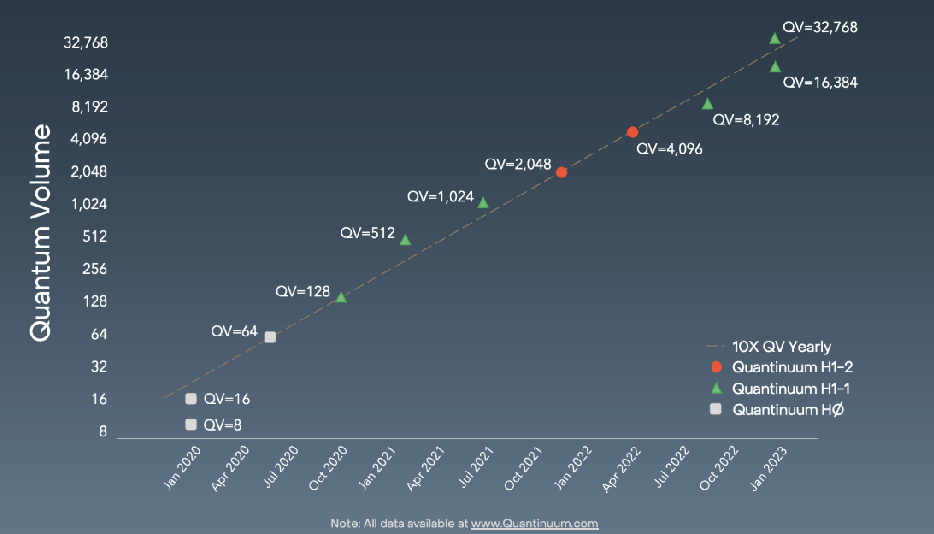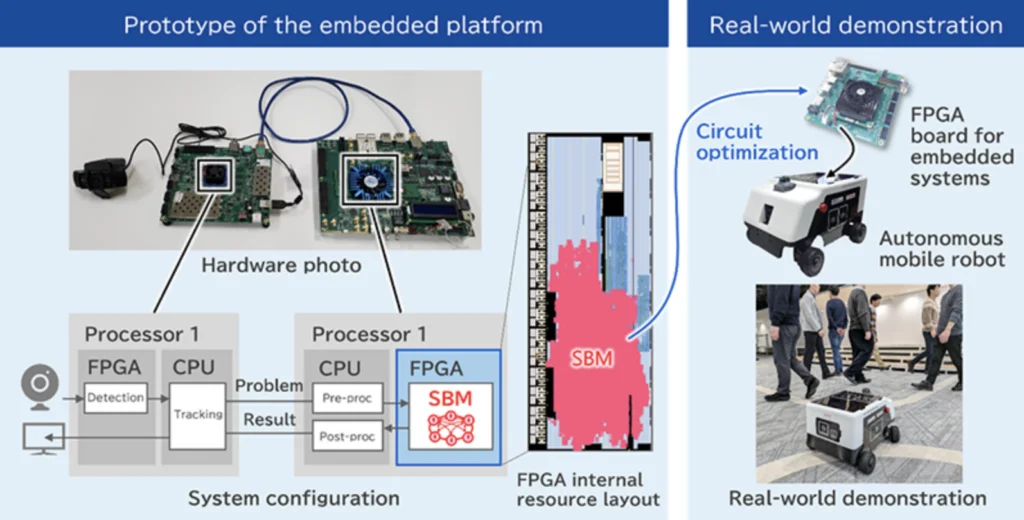Insider Brief
- Quantinuum announced its H1 generation quantum processors set two performance record recently.
- The device achieved a quantum volume (QV) of 16,384 (214), and then 32,768 (215).
- Critical Quote: “Quantum volume is crucial to the ongoing development and research necessary to create the bigger and better quantum computers needed to achieve a quantum advantage. Quantinuum has prioritized increasing its quantum volume since the start, which has not only benefitted its current applications but set itself up to be the benchmark in achieving quantum advantage.” — Paul Smith-Goodson, Analyst, Moor Insights and Strategy.
PRESS RELEASE — Quantinuum, the world’s largest standalone integrated quantum computing company, today announced its H1 generation quantum processors set two performance records in quick succession, with its H1-1 achieving a quantum volume (QV) of 16,384 (214), and then 32,768 (215). The achievements represent a high-water mark for the quantum computing industry, based on the widely recognized QV benchmark, which was originally developed by IBM to reflect a quantum computer’s general capability.
“Quantum volume is crucial to the ongoing development and research necessary to create the bigger and better quantum computers needed to achieve a quantum advantage,” said Paul Smith-Goodson, Analyst, Moor Insights and Strategy. “Quantinuum has prioritized increasing its quantum volume since the start, which has not only benefitted its current applications but set itself up to be the benchmark in achieving quantum advantage.”
This marks the eighth time in less than three years that Quantinuum’s H-Series, which is based on quantum charge coupled device technology, has set an industry benchmark, and fulfills a public commitment made in March 2020 to increase the performance of the H-Series quantum processors, Powered by Honeywell, by an order of magnitude each year for five years.

“This is a remarkable milestone for quantum computing and inline with the technology we have seen from Quantinuum,” said Marco Pistoia, Ph.D., Distinguished Engineer and Head of Global Technology Applied Research, JPMorgan Chase. “As evidenced in our research, we have produced groundbreaking algorithms on their quantum computers for the past several years, which has allowed us at JPMorgan Chase to be on the leading edge of quantum computing. We look forward to continuing to make more breakthroughs in quantum computing together.”
To provide more detail on the underlying technological improvements that led to the new benchmark, Quantinuum revealed details of recent performance enhancements to the H-Series, including reductions in the phase noise of the device’s lasers, reducing two-qubit gate error and memory error, and improvements to elements of the calibration process. Scientists at Quantinuum also shared insights into how the improvements that resulted in the new benchmark reduce the time it takes for algorithms to run, improve the ability to run quantum error correction codes, and lead to better results for the scientists and researchers using the H-Series hardware.
“We are exactly where we expect to be on our roadmap,” said Tony Uttley, President and COO of Quantinuum. “Our hardware team continues to deliver technical improvements right across the board, and our approach of continuously upgrading our quantum computers means that these are felt immediately by our customers.”
A five-digit QV number is very positive for real-time quantum error correction (QEC) because of the low error rates, number of qubits, and very long circuits. QEC is a critical ingredient to large-scale quantum computing and the sooner it can be explored on today’s hardware, the faster it can be demonstrated at large-scale.
“With the technology improving fast, we do everything we can to help our customers and the community understand how we are achieving such rapid progress,” said Jenni Strabley, Senior Director of Offering Management at Quantinuum. “Which is why we have published the data behind the results we announced today. Our goal is to accelerate quantum computing, and that is something we can only achieve as an industry.”
Further details on the Quantum Volume tests: https://quantum-journal.org/papers/q-2022-05-09-707/
Quantinuum’s GitHub repository for Quantum Volume data: https://github.com/CQCL/quantinuum-hardware-quantum-volume
Quantinuum’s GitHub repository for hardware specifications: https://github.com/CQCL/quantinuum-hardware-specifications
For more market insights, check out our latest quantum computing news here.














